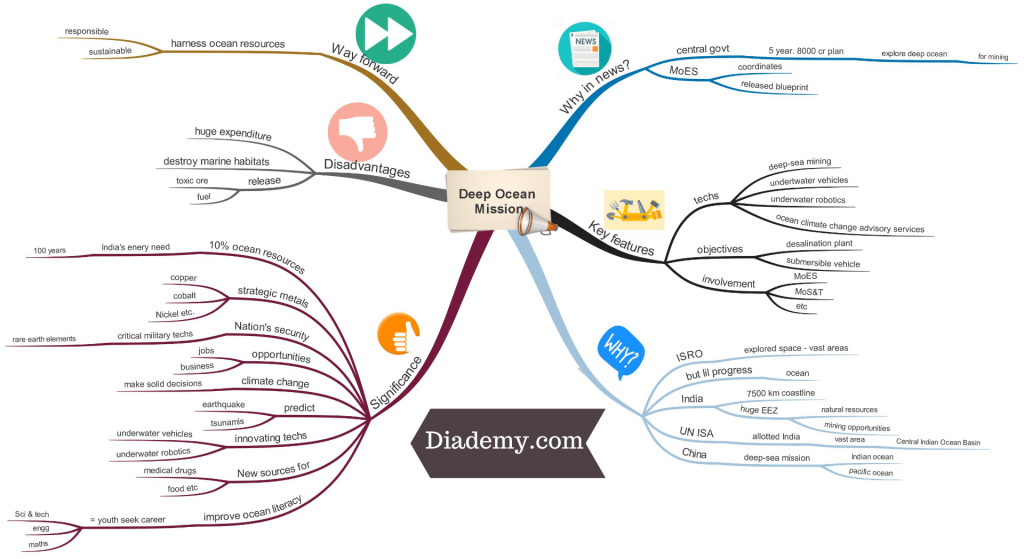Centre has formulated 5 year, 8,000 crore plan to explore on Deep Ocean Mission for possibilities of deep-sea mining.Union Ministry of Earth Sciences is tasked with coordinating the exercise.The Mission proposes to explore the deep ocean similar to the space exploration started by ISRO.Focus will be on technologies for deep-sea mining, underwater vehicles, underwater robotics and ocean climate change advisory services etc.
Objectives Of Deep Ocean Mission
- Desalination plant powered by tidal energy.
- Submersible vehicle to explore depths of at least 6000 Meters with three people on board.
- Involve other ministries like science and technology, and biotechnology etc.
Need
- ISRO has been exploring space but there is a very little progress when it comes to the Ocean.
- India has a vast 7,500 km of coastline along with a 2.4 million square km of Exclusive Economic Zone which hosts a huge amount of natural resources and mining opportunities such as iron, nickel, manganese, and cobalt.
- India was allotted vast areas in the Central Indian Ocean Basin by the UN International Seabed Authority for the exploitation of poly-metallic nodules.
- China has been working on a deep-sea mission for mining mineral deposits in Indian and Pacific Oceans.
Significance
- Estimated that 10% of recovery of the ocean resources can meet India’s energy requirements for the next 100 years.
- India’s EEZ has about estimated resources of about 100 million tons of strategic metals such as copper, nickel, cobalt etc that will significantly boost the Indian economy.
- It will play a significant role in the security of the nation as many critical military technologies rely heavily on rare earth elements that are abundant in Ocean.
- It will also create jobs and business opportunities in ocean science and improve the prosperity of the nation.
- Mission can also help in forming solid decisions on Climate Change.
- Information from deep-ocean exploration can help predict earthquakes and tsunamis.
- It can also help us in innovating technologies from underwater vehicles to underwater robotics.
- Unlocking the mysteries of deep-sea ecosystems can reveal new sources for medical drugs, food and other products.
- Ocean exploration can improve ocean literacy and inspire young people to seek careers in science, technology, engineering, and mathematics.

Image Source – Google
Disadvantages of Deep Ocean Mission
- Deep ocean exploration involves huge expenditure due to the usage of various state- of-the- art technologies such as pressured submersibles to carry people or remote-controlled vehicles.
- Deep-sea mining involves depositing huge tons of waste rocks onto the seabed, potentially destroying the habitats of some deep-sea organisms.
- An even more worrying aspect is the accidental spillage due to the release of toxic ore and fuel into the surrounding area, threatening marine organisms and ecosystems.
Way forward
Deep-sea exploration is still an unchartered area, if not careful, then it would lead to severe environmental damages that could threaten the marine ecosystem and in the long term, other ecosystems as well. Hence India should harness the ocean resources in a responsible manner with respect to its sustainable development goals.